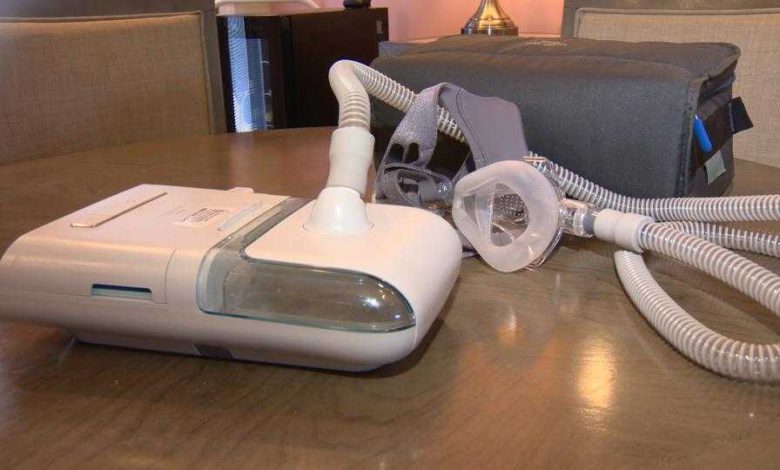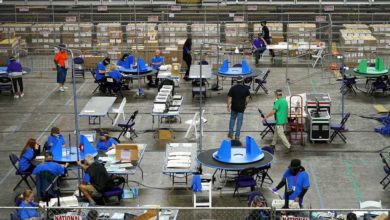

Millions of people rely on machines to help them with sleep disorders, but now some of the devices have been recalled because they could pose serious health problems.Baltimore sister station WBAL-TV reported many people are having difficulties getting replacements, and what a Maryland man did to protect his health.Charles Mercer believes his machine helped change his life."My wife always complained about me snoring, and then she said, 'You know, you actually stop breathing at night,'" Mercer said.Mercer suffers from sleep apnea, and the device he uses is designed to keep him breathing without any pauses while he sleeps. Mercer has had it for less than a year, and now he worries it could cause him harm."I could see if I had broken it or misused it — none of that. It was working fine," Mercer said.Mercer stopped using his DreamStation in June after Philips, the manufacturer, announced a voluntary recall of certain continuous positive airway pressure (CPAP), bilevel positive airway pressure (BiPap) and ventilator machines.WBAL checked with Northwest Hospital and other places that help patients who have sleep disorders."It's very scary. We have a lot of patients concerned. We hear about it from patients who come to our sleep labs," said Sarah Tencza, with respiratory and sleep services at Northwest Hospital.Philips lists the recalled machines on its website and explains the foam used to reduce sound and vibration may break down.Medical device recall notificationRecalled CPAP and BiLevel PAP DevicesAccording to the U.S. Food and Drug Administration, black debris from the foam or certain chemicals released into the device's air pathway may be inhaled or swallowed. Nationwide, the FDA said there have been more than 1,200 complaints and more than 100 injuries reported.Exposure to the debris or chemicals could cause health issues, including skin, eye and respiratory irritation; headaches; asthma; nausea; and it could also impact the kidneys, liver or potentially cause cancer, according to the FDA."Normally, when things break, you have a recall and the company fixes it just like a car," Mercer said.But the company said it has no quick fix.In an email, Mario Fante, senior press officer for the Philips Global Press Office, wrote: "We fully understand the impact this is having on patients. Our priority is to replace the foam in all affected devices either by repair or replacement. We are unable to provide an immediate solution at this time."Philips estimates 3 million to 4 million units are in use globally — about half of which are in the United States. The company said it has "increased production of repair kits and replacement devices" to 55,000 a week and hopes to increase that capacity to 80,000.But the company can't send them out yet. It's still waiting for regulatory clearance from the FDA.Meanwhile, Philips advises against using the affected CPAP and BiPap machines and suggests users consulting their doctor.Dr. Jennifer So, the University of Maryland Sleep Lab's director, said patients definitely need to talk to their physicians about their best options "to see if the small risks from foam degrading and not using the machine is greater than the benefits they may get from being able to sleep and breathe at nighttime and maintain oxygen saturation."So said in some cases, not using the machines can lead to uncontrolled blood pressure and heart and lung problems."I'm scared to use this one. They said, 'Use it if you want at your own risk.' I said, 'I don't know about that,'" Mercer said.Mercer said he did register his BiPap machine online as Philips requested. When he stopped using his DreamStation, his wife didn't like it."I started going back to snoring. She was complaining. I said, 'I got to do something,'" Mercer said, laughing.To keep peace at home and protect his health, Mercer purchased a different machine from another company. Others have done the same, and that has caused a shortage of sleep apnea machines. Mercer now wonders if he'll get reimbursed the more than $1,700 he spent on the replacement."Sometimes, you look for justice. Sometimes, there is none. You just have to keep surviving," Mercer said.Philips claimed using what's called an inline bacterial filter may help. Mercer didn't have much confidence in that solution. The FDA said it has no evidence of the safety or effectiveness of using that type of filter for mitigating foam risks.Philips said people who use an affected ventilator should not stop using it and should consult their doctor.
Millions of people rely on machines to help them with sleep disorders, but now some of the devices have been recalled because they could pose serious health problems.
Baltimore sister station WBAL-TV reported many people are having difficulties getting replacements, and what a Maryland man did to protect his health.
Charles Mercer believes his machine helped change his life.
"My wife always complained about me snoring, and then she said, 'You know, you actually stop breathing at night,'" Mercer said.
Mercer suffers from sleep apnea, and the device he uses is designed to keep him breathing without any pauses while he sleeps. Mercer has had it for less than a year, and now he worries it could cause him harm.
"I could see if I had broken it or misused it — none of that. It was working fine," Mercer said.
Mercer stopped using his DreamStation in June after Philips, the manufacturer, announced a voluntary recall of certain continuous positive airway pressure (CPAP), bilevel positive airway pressure (BiPap) and ventilator machines.
WBAL checked with Northwest Hospital and other places that help patients who have sleep disorders.
"It's very scary. We have a lot of patients concerned. We hear about it from patients who come to our sleep labs," said Sarah Tencza, with respiratory and sleep services at Northwest Hospital.
Philips lists the recalled machines on its website and explains the foam used to reduce sound and vibration may break down.
According to the U.S. Food and Drug Administration, black debris from the foam or certain chemicals released into the device's air pathway may be inhaled or swallowed. Nationwide, the FDA said there have been more than 1,200 complaints and more than 100 injuries reported.
Exposure to the debris or chemicals could cause health issues, including skin, eye and respiratory irritation; headaches; asthma; nausea; and it could also impact the kidneys, liver or potentially cause cancer, according to the FDA.
"Normally, when things break, you have a recall and the company fixes it just like a car," Mercer said.
But the company said it has no quick fix.
In an email, Mario Fante, senior press officer for the Philips Global Press Office, wrote: "We fully understand the impact this is having on patients. Our priority is to replace the foam in all affected devices either by repair or replacement. We are unable to provide an immediate solution at this time."
Philips estimates 3 million to 4 million units are in use globally — about half of which are in the United States. The company said it has "increased production of repair kits and replacement devices" to 55,000 a week and hopes to increase that capacity to 80,000.
But the company can't send them out yet. It's still waiting for regulatory clearance from the FDA.
Meanwhile, Philips advises against using the affected CPAP and BiPap machines and suggests users consulting their doctor.
Dr. Jennifer So, the University of Maryland Sleep Lab's director, said patients definitely need to talk to their physicians about their best options "to see if the small risks from foam degrading and not using the machine is greater than the benefits they may get from being able to sleep and breathe at nighttime and maintain oxygen saturation."
So said in some cases, not using the machines can lead to uncontrolled blood pressure and heart and lung problems.
"I'm scared to use this one. They said, 'Use it if you want at your own risk.' I said, 'I don't know about that,'" Mercer said.
Mercer said he did register his BiPap machine online as Philips requested. When he stopped using his DreamStation, his wife didn't like it.
"I started going back to snoring. She was complaining. I said, 'I got to do something,'" Mercer said, laughing.
To keep peace at home and protect his health, Mercer purchased a different machine from another company. Others have done the same, and that has caused a shortage of sleep apnea machines. Mercer now wonders if he'll get reimbursed the more than $1,700 he spent on the replacement.
"Sometimes, you look for justice. Sometimes, there is none. You just have to keep surviving," Mercer said.
Philips claimed using what's called an inline bacterial filter may help. Mercer didn't have much confidence in that solution. The FDA said it has no evidence of the safety or effectiveness of using that type of filter for mitigating foam risks.
Philips said people who use an affected ventilator should not stop using it and should consult their doctor.
Source link









